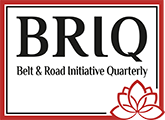
BRIQ (Belt & Road Initiative Quarterly) is currently seeking submissions for a special issue on “Scientific and Technological Cooperation in the Framework of the Belt and Road Initiative”.
Science, technology and innovation –often viewed as the main engine of development– are crucial to resolving today’s key challenging problems for all nations across the globe. In addition to domestic science and technology (S&T) efforts, nations seek international cooperation with the intention of helping all partners involved in creating innovation with efficient and sustainable use of resources. An important function of international cooperation is to facilitate cultural and economic integration. Various bilateral, regional or global cooperation agreements are signed to facilitate S&T cooperation. For example, the European Union (EU) has created various mechanisms to fund international research among its members, occasionally involving non-EU countries as well. Besides these formal agreements, cooperation may also take place through cooperation at personal levels, sometimes by movement of people. Yet, scientific and technological cooperation may lead to brain drain, which makes it even more difficult for less-developed countries to benefit from. Due to its complicated effects on international relations, S&T cooperation has become a strategic foreign-policy tool for developed nations.
The fact that the focus of S&T is shifting from the West to the East creates historic opportunities for many developing nations to increase their contribution to global S&T development and benefit from its results for sustainable development. This requires developing policies at the national level, taking part of multilateral agreements and engaging in international institutions.
As a comprehensive program involving a large number of nations, the Belt and Road Initiative (BRI) also addresses S&T cooperation. Particularly, there have been considerable debates in scientific circles regarding how sustainable development can be supported within BRI’s framework. China is supporting various initiatives for this purpose.
As BRI takes shape, there is a need for substantial debates on how open, cooperative and inclusive scientific cooperation can be established among partnering countries for the good of all humanity. Based on the context depicted above, the Belt & Road Initiative Quarterly (BRIQ) calls for academic articles, essays and book reviews that address issues related (but not limited) to the following areas:
- Prioritization of research areas for cooperation to foster development in BRI countries;
- S&T cooperation in BRI countries’ context of environmental protection, (inter)national security and economic development;
- The geopolitics of S&T cooperation;
- Organizational and policy level issues for efficient and effective cooperation;
- Comparative analysis of current regional cooperation schemes;
- Mechanisms for avoiding brain drain;
- National S&T policy recommendations;
- Rational and sustainable use of energy;
- The energy quadrilemma (Energy, Environment, Human Health and Welfare, Economy) and proper solutions through BRI cooperation;
- S&T cooperation between universities, firms, and countries among BRI countries;
- The role of S&T cooperation in social development;
- New paths to improved industrial capacity and cooperation between developing countries…
Deadline for Paper Submissions: February 01, 2021
Journal Information and Submission Guidelines
BRIQ (Belt & Road Initiative Quarterly) is a scholarly journal of international politics, economy, and culture.
Belt and Road Initiative Quarterly (BRIQ) features a broad range of content, from academic articles to book reviews, review essays, interviews, news reports, and feature articles.
The Editorial Board can issue calls for papers for special issues and invite authors to contribute manuscripts; however, it also welcomes unsolicited submissions.
Submissions are invited in English or Turkish. All submissions are to include a short biography (150-word limit) and should be sent as Microsoft Word attachments to briq@briqjournal.com . Articles or other content that have been previously published or are under review by other journals will not be considered for publication.
BRIQ follows American Psychology Association style (6th edition, https://www.apastyle.org) and uses American English spelling.
BRIQ uses a double-blind review process for all academic articles.
Academic articles should be between 5,000 and 9,000 words in length, including abstracts, notes, references, and all other content. Please supply a cover page that includes complete author information, and a fully anonymized manuscript that also contains an abstract (200- word limit) and 5 keywords.
Book reviews should not exceed 1,000 words; review essays covering two or more works can be up to 3,000 words.
News reports consisting of brief analyses of news developments should not exceed 1,500 words; feature articles combining reporting and analysis can be up to 3,500 words.
Please contact the Editorial Board for interview proposals.
